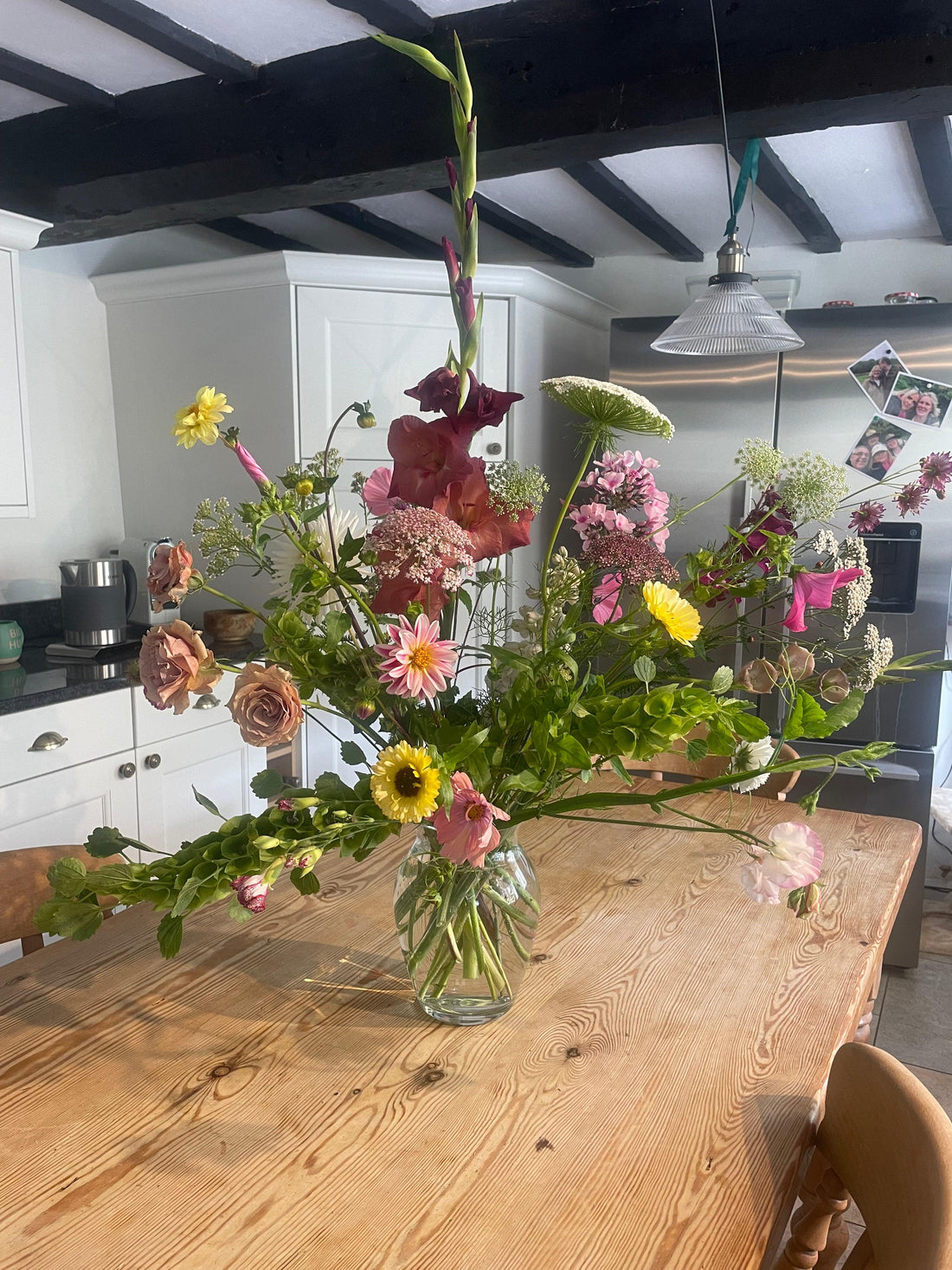
Blooms with a Smaller Footprint: The Environmental Impact of Choosing Local Flowers
Share
Imagine the delight of receiving a bouquet: the rush of colour, the lush textures, and the dance of fragrances. Yet, behind these beautiful blooms lies a less charming story of the global flower market – a vast network that often prioritises mass production over sustainability. This industry's reach extends around the world, and the environmental impacts are significant, from extensive shipping distances to heavy chemical use.
In contrast, locally grown flowers like those from Carobeth offer a breath of fresh air, minimising carbon footprints and supporting healthier ecosystems. Let’s delve into why choosing local blooms isn’t just good for the soul but essential for our planet.
Comparing the Carbon Footprint of Local vs. Imported Flowers
As we delve into the floral industry's environmental impacts, it becomes clear that the carbon emissions associated with flower transportation are significant, especially when flowers traverse continents. For instance, flowers imported to the UK from far-flung locations like Ecuador, Colombia, Kenya and Ethiopia carry a hefty carbon load due to the long distances they travel. This is starkly contrasted by British flowers, which travel much shorter distances, significantly reducing their carbon footprint.
When you factor in the production methods and the transport implications the statistics reveal a sobering reality: Dutch lilies generate about 3.478 kg of CO2 per stem, while a similar lily grown in the UK emits approximately 0.819 kg of CO2. This pattern holds across various flowers, with British-grown snapdragons and alstroemerias emitting only a fraction of the CO2 compared to their foreign counterparts. For a clearer picture, consider this comparison: an imported mixed bouquet can produce emissions ten times greater than a bouquet composed of flowers grown outdoors in the UK.
These high emissions from imported flowers are largely due to intensive transportation and the need for heating and electricity in large-scale production settings. A mixed bouquet from Kenya or the Netherlands can emit up to 32.252 kg of CO2, whereas a locally grown UK bouquet emits as little as 1.71 kg of CO2.
Beyond carbon emissions, the widespread use of chemicals in mass-produced flowers to enhance their longevity and appearance for global shipping is another critical concern. These practices starkly contrast with the approach at local farms like Carobeth, where flowers are grown organically and seasonally, without reliance on harsh chemicals. This not only preserves local ecosystems but also supports healthier living environments for both flora and the surrounding wildlife.
Choosing locally grown flowers not only supports the environment by reducing carbon footprints but also enhances local economies and promotes biodiversity. As we become more conscious of our environmental impact, the decision to opt for locally sourced flowers is a small but powerful step towards a more sustainable and vibrant planet.
Benefits of Local Flowers: Nurturing Nature and Neighbourhoods
Choosing local flowers offers a plethora of advantages that extend beyond simple aesthetics, touching on environmental, economic and sensory aspects that resonate deeply with our community values and ecological responsibilities.
Environmental Benefits: Local flowers play a critical role in reducing carbon emissions, primarily by minimising the need for long-distance transportation, which is prevalent in the international flower market. By opting for flowers grown within close proximity, we significantly lower our carbon footprint. Furthermore, local flowers support biodiversity. By maintaining a variety of native plants, local farms help sustain a range of local wildlife, contributing to healthier ecosystems. This practice ensures that the natural balance of the local environment is respected and preserved, fostering a thriving habitat for bees, butterflies and other crucial pollinators.
Economic Benefits: When you buy local flowers, you're not just purchasing a bouquet; you're investing in your community. Supporting local farms helps sustain local economies, creating jobs and building more resilient communities. Local farmers can reinvest profits back into the local economy, enhancing the overall economic health of the area.
Aesthetic and Sensory Benefits: There’s an undeniable charm in the beauty and fragrance of locally grown flowers. Cultivated with care and picked at their peak, these blooms offer superior quality and freshness. Unlike mass-produced flowers, which are often bred for durability and sometimes lack scent, local flowers boast vibrant colours and rich aromas. They bring a piece of the local landscape directly into your home, providing not just decoration but an experience that delights the senses and connects you to your local environment.
Embracing local flowers thus offers a holistic approach to beauty, benefiting our planet, supporting our neighbours, and enriching our lives with natural splendour that genuinely makes a difference.
How to Choose Sustainable Flowers
Selecting sustainable flowers involves more than just appreciating their beauty. It's about making informed decisions that contribute to the well-being of our environment. Here are some practical tips to help you choose flowers that not only look good but also do good:
Practical Tips: When purchasing flowers, ask your florist about the origin of the blooms. Look for labels or certifications that indicate organic or sustainable practices, such as those certified by local agricultural bodies. Inquire whether the flowers were grown using eco-friendly methods that minimise chemical use and reduce water waste.
Supporting Local: One of the best ways to ensure your flowers are sustainable is by buying directly from local growers. Engage with community-supported agriculture (CSA) programs, where you can receive seasonal flowers directly from the farm. This not only supports local farmers but also reduces transportation emissions, helping to protect the environment.
Seasonal Choices: Opt for flowers that are in season locally. Seasonal blooms don't require the artificial climate control needed for off-season flowers, which significantly lowers their environmental impact. Additionally, seasonal flowers are often fresher and more vibrant, providing you with the best quality and an authentic reflection of the local landscape.
By choosing sustainable flowers, you're not just decorating a space; you're endorsing a lifestyle that respects and nurtures the planet. Whether you're adorning a table for a special occasion or sending a bouquet to a loved one, make your floral choices count for more.
Cultivating Change: Embrace the Beauty of Locally Grown Flowers
Choosing British flowers from small farms like Carobeth isn't just a purchase – it's a commitment to sustainability, community support and ecological health. By supporting local growers, you help foster biodiversity, reduce environmental impact and enjoy superior freshness and beauty. Let’s cultivate a greener future together.
Embrace the charm and responsibility of locally grown blooms and make a positive impact with every bouquet. Join us in this floral revolution, shop our flower collection here.
